SNP conference: Sturgeon announces 'immediate' NHS pay rise
- Published
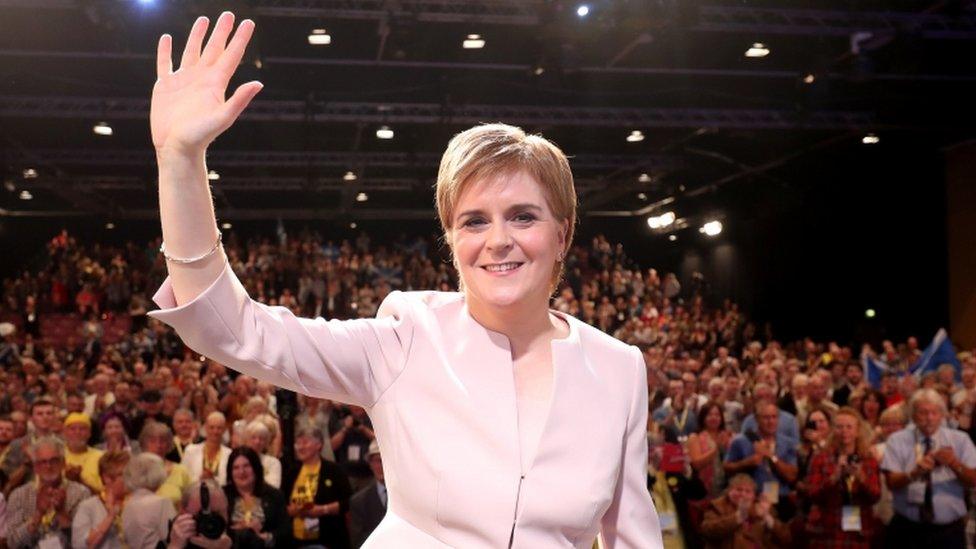
Ms Sturgeon's announcement was met by cheers from delegates at the conference
The majority of NHS Scotland staff will receive a 3% pay rise this year, Nicola Sturgeon has announced.
She told the SNP conference that staff currently earning up to £80,000 will receive at least a 3% increase.
And she pledged that the "immediate" pay rise "will be in their pay packets next month".
She said the move meant the vast majority of frontline NHS Scotland staff will be paid more than in NHS England.
It was confirmed on Friday that more than a million NHS workers in England will receive a three-year pay deal worth 6.5% after staff voted in favour of the offer. They will also get the money in their July pay packets, backdated from April.
Ms Sturgeon also used her speech to contrast the "shambolic" UK government with her party's achievements at Holyrood.
She repeated her call for immigration policy to be devolved to the Scottish Parliament.
And she announced 750 new or refurbished nurseries to help deliver an increase in free pre-school provision, and more funding for students who have been in care.
But she gave no details of when a second Scottish independence referendum could be held.
Ms Sturgeon was speaking as the two-day conference in Aberdeen drew to a close.
How will the NHS pay rise work?
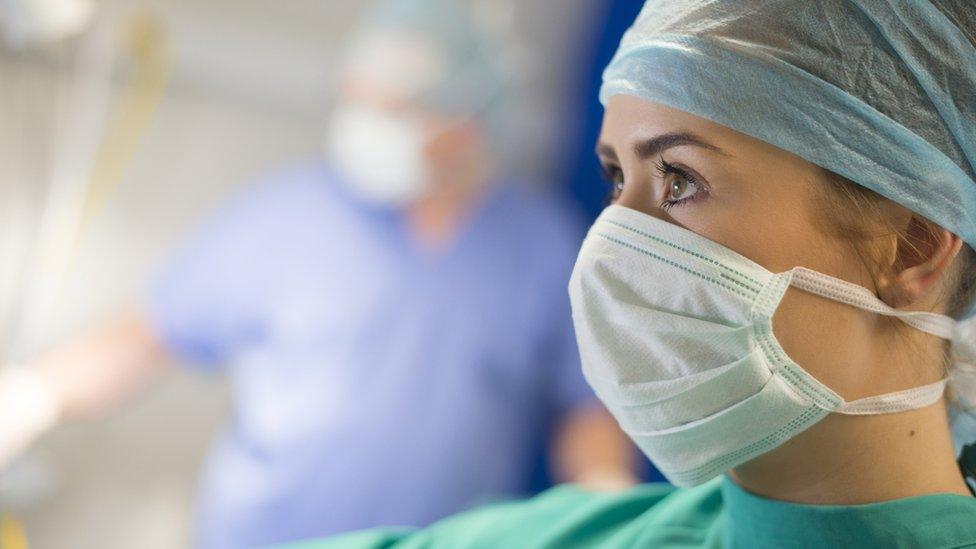
The announcement will benefit 147,000 nurses, midwives, paramedics and other NHS staff
Ms Sturgeon told delegates that the past few years of pay restraint had been "tough" on NHS staff and other public service workers.
She added: "We're currently in negotiations to agree a three year pay deal for NHS staff in which we aim to not just match but exceed the deal agreed in England. I hope these talks reach a positive conclusion soon.
"But I don't want those working so hard in the NHS to have to wait for that agreement to get a pay rise this year. So I can announce today that we will make a payment on account as negotiations continue."
Staff currently earning up to £80,000 will receive at least a 3% uplift, and those earning £80,000 and over will receive a flat rate increase of £1,600.
Staff not at the top of their pay bands will also receive any incremental progression they are due.
The announcement will benefit 147,000 Agenda for Change staff, such as nurses, midwives, allied health professionals, therapists, paramedics, support staff and administrators.
Ms Sturgeon said the move would mean auxiliary nurses in Scotland with a year's experience in Band 4 would be over £800 a year better off than those in England, and nurses with five years' experience in Band 5 £400 better off.
What did she say about independence?
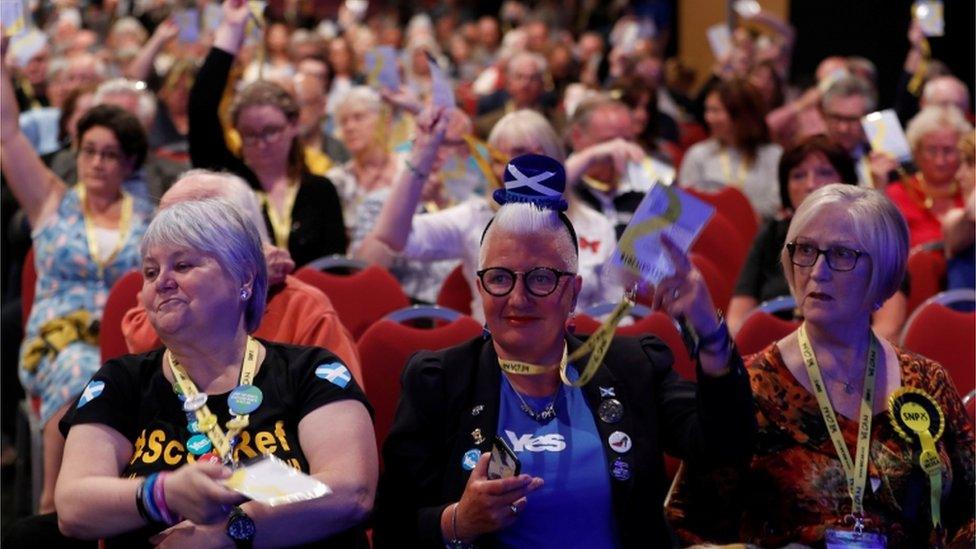
In her speech the first minister urged supporters to focus not just on the "when" of a second independence referendum, but also to "use our energy and passion to persuade those who still ask 'why?'".
Ms Sturgeon did not directly address the potential timing of any referendum, having previously pledged to do so in the autumn when the implications of Brexit become clearer.

Analysis by Philip Sim, BBC Scotland political reporter
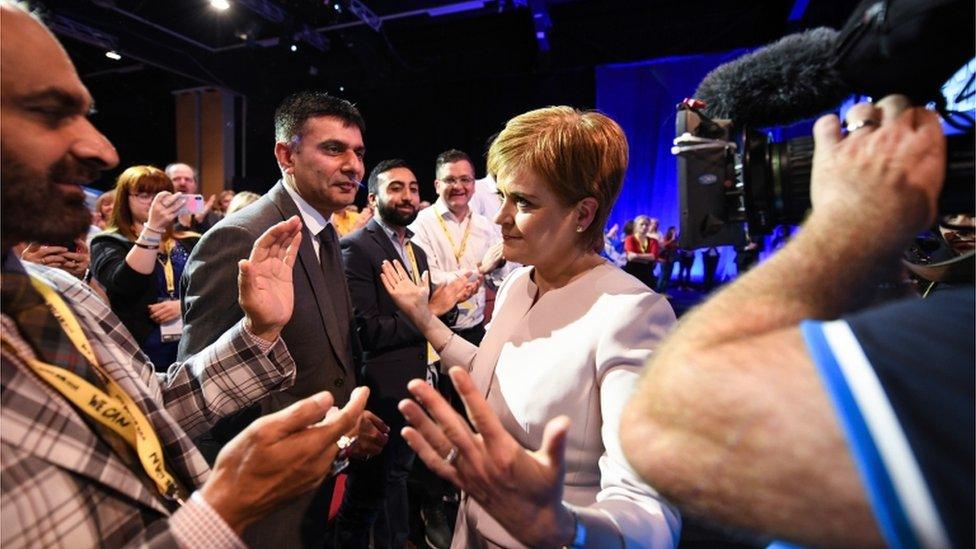
The SNP conference has been a slightly subdued affair this year, with a heavy focus on the technicalities of the party's internal constitution rather than rhetoric about the national one.
But Nicola Sturgeon's keynote speech can always be relied upon to get the faithful on their feet.
There was a hefty dollop of "day job" material, from nurseries and tuition fees to a big announcement on NHS pay.
But the memorable moments in the speech were red meat for the masses of the SNP membership - attacks on the "shambles" of a Westminster government and assurances that independence is closer than ever.
Is it?
In terms of timetabling for a referendum, no. The telling moment was when Ms Sturgeon urged her troops not to focus just on the 'when' of independence, but to work on winning people over to the 'why' of it, "as we wait for the fog of Brexit to clear".
In terms of winning the argument, then? SNP members are heading off to a series of "national assemblies" to discuss the growth commission report on the economy.
But their votes are in the bag already. The greater question is what the rest of the country makes of it.

Ms Sturgeon praised her party's recent Growth Commission report, which she said "doesn't shy away from challenges" or "pretend there are always easy answers".
And she said the document "lays strong foundations" for independence and "offers a brighter future than Brexit and Westminster austerity".
The report was met with a mixed response from independence supporters when it was published a fortnight ago.
It examines the economic options for an independent Scotland, and proposes keeping the pound and embarking on a major deficit reduction programme in the first years after leaving the UK.
What else did the SNP leader say?
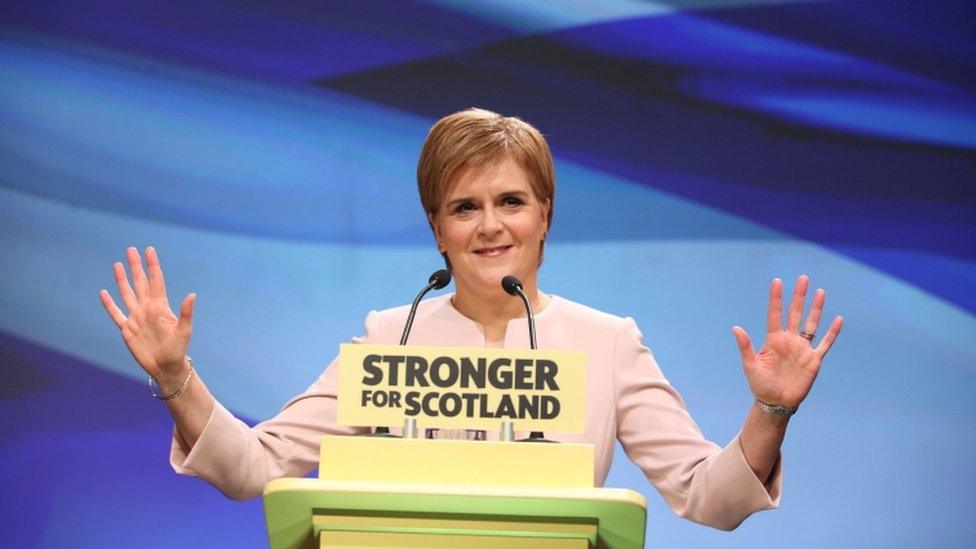
The first minister claimed that the "shambolic Westminster Tory government is holding Scotland back, while the Scottish government is moving Scotland forwards".
And she highlighted the "disastrous" impact she believes the UK government's "hostile migration policy" is having on Scotland's public services and economy.
Ms Sturgeon added: "Scotland is a welcoming country - our prosperity and our public services depend on it.
"If Westminster cannot or will not act in our best interests, it is time that our own parliament was able to do so. It's time for powers over migration to come to Scotland."
What else happened at the conference?
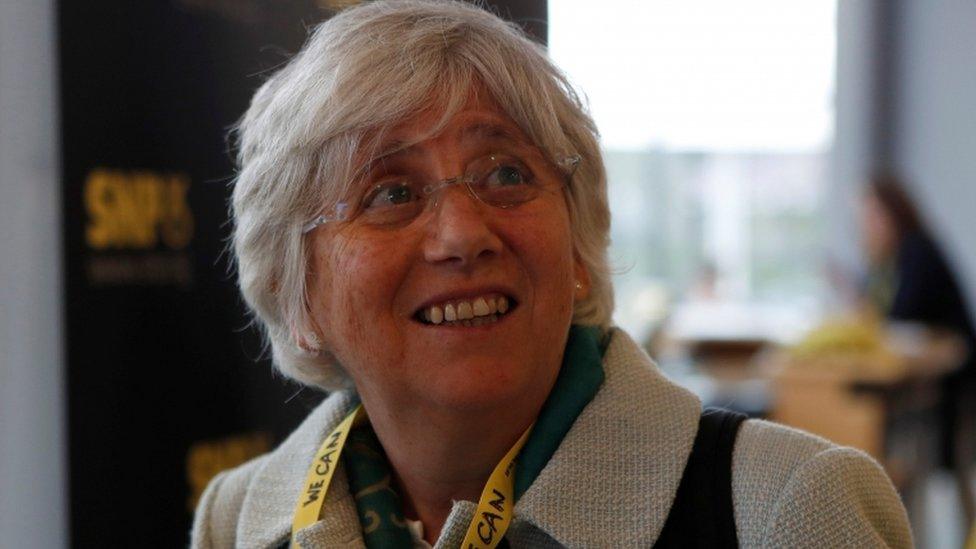
The SNP is overwhelmingly supportive of Clara Ponsati and the Catalan independence movement
Pro-independence Catalan politician Clara Ponsati, who is fighting a legal battle against being extradited from Scotland to Spain, spoke directly before Ms Sturgeon.
Prof Ponsati thanked her Scottish supporters Scots for their "overwhelming" backing in her fight, and told the conference: "I am really overwhelmed by the affection and the support I have received since I put my feet back in Scottish territory.
"What you are doing is showing your belief in democracy and human rights. Catalans are deeply grateful to you for that."
Prof Ponsati has been accused by the Spanish authorities of rebellion - defined under Spanish law as being involved in a violent uprising - and misappropriation of public funds for her role in the Catalan referendum.
The conference opened on Friday morning with Keith Brown being confirmed as the SNP's new deputy leader following a vote by party members.
Mr Brown, who is also Scotland's economy secretary, succeeds former MP Angus Robertson in role after finishing ahead of activist Julie Hepburn and Inverclyde councillor Chris McEleny in the contest.